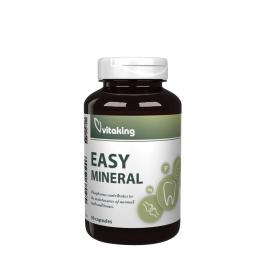Minerals are elements with a crystalline structure (they cannot be further broken down) that are essential for the proper functioning of our body. They include: calcium, magnesium, chlorine, zinc, chromium, iodine and others. Minerals play many different roles in our bodies. They influence biological reactions, enzymes, are involved in the formation of cell-cell relationships and affect hormone levels.
To give you a couple of examples, in order for two nerve cells to communicate electrically, you need sodium, chlorine, calcium, potassium and, if the nerve cell is connected to a muscle, magnesium and sulphur. To get the sugar from the blood into the cells via insulin, you need chromium, magnesium, zinc, manganese, selenium, molybdenum and probably vanadium. So the minerals work together to produce an impressively broad spectrum of effects. That's why complex mineral formulations exist, to enhance a particular effect.
Calcium, magnesium and zinc are needed for bone strength. That is why we offer complex mineral formulas specifically designed for bone strength.
Research on the bones of various animals and humans has shown that the majority of the mineral content of bones is calcium, bones contain calcium in a special mineral (hydroxyapatite). In childhood, calcium helps bones to develop properly, and if bones develop properly in childhood, osteoporosis can be prevented. Calcium can also strengthen bones in adulthood, helping to prevent fractures, thanks to its ability to reduce parathyroid hormone levels. And elevated parathyroid hormone levels reduce bone mineral levels, this is because parathyroid hormone's primary function is to increase blood calcium levels, so it extracts calcium from several places in the body, starting with where it is cumulatively available (in the bones). And if there's enough calcium in the blood, parathyroid hormone doesn't have to work, so it won't be produced.
60% of magnesium is stored in the bones, on the surface of hydroxyapatite. Low magnesium levels are a risk factor for osteoporosis, because in the absence of magnesium, hydroxyapatite has more difficulty maintaining its structure, so the aforementioned breakdown process takes place. The link between magnesium deficiency and osteoporosis has been reported in several studies.
Zinc also has a beneficial effect on bone health and may help recovery from osteoporosis, partly because the calcium transport channels can also transport zinc (so it can go where the calcium goes) and partly because it increases levels of IGF-1, a hormone that builds bone and IGF-1 stimulates the cells that build bone.
We also offer complex formulas containing the main minerals, which can be very useful for people who don't get enough minerals. Especially for people who do physical work or hard training, as our body uses more minerals during these types of stressful activities.








































